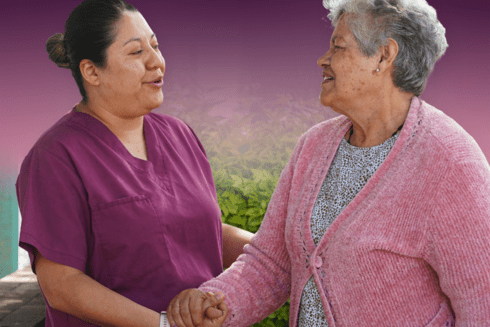Latin America and the Caribbean are aging faster than any other region in the world. This trend is driving a sharp rise in the number of older people who need help with activities of daily living. However, most countries in the region offer very limited or no care services for this aging demographic. Families—and especially women—usually step in to fill the gap.
At the Inter-American Development Bank, we view long-term care services as a crucial component of current and future social protection systems, so in 2018 we created this web portal, the Panorama of Aging and Long-Term Care. Here you will find technical information on how to design and implement long-term care systems.
- Aging in Latin America and the Caribbean: Social protection and quality of life of older persons analyzes the quality of life of older people in the region and its relationship to the coverage, quality, and sustainability of social protection in the form of pensions, healthcare and long-term care.
- Age with Care: Long-term Care in Latin America and the Caribbean makes the case that long-term care systems should be a priority in the region, and analyzes the steps needed to build them.
- Four Elements for designing a Long-term Care System (Spanish only) discusses the importance of defining the target population of support services, the services to be included, how to ensure quality, and how the system will be financed.
- Long-Term Care in Latin America and the Caribbean?: Theory and Policy Considerations analyzes the pros and cons of providing services versus cash transfers to support families with long-term care needs.
- Trends and challenges to form a long-term care system in Costa Rica (Spanish only) reflects on the implications of Costa Rica’s sociodemographic and epidemiological transformations in light of other countries’ experiences with long-term care systems.
- Prevalence of care dependence among older persons in 26 Latin American and the Caribbean estimates the number of people who currently need long-term care in 26 countries in the region. It also provides projections up until 2050.
- The use of scales to assess functionality and care dependency in the elderly: practices, advances, and future directions (Spanish only) discusses how instruments for assessing functional dependence are being developed and implemented in the region, identifying areas for improvement.
- Panorama of aging and long-term care in Latin America and the Caribbean (Spanish only) estimates the percentage of older people who are care dependent in selected countries of the region, as well as the correlation between care dependence and chronic diseases.
- Data associated with Panorama of Aging and Long-Term Care in America Latina and the Caribbean.
- Why and How to Develop Day Centers: Putting the Well-Being of Older People and Caregivers First analyzes day centers in Latin America and internationally, particularly in Uruguay, Argentina, Mexico, the United States and France. It also compiles the multiple benefits of day centers for their users, family caregivers, the social and health care system, and their prices in the region.
- Cash and Counseling: Self-directed home and community long-term care explores how the Cash and counseling program works and how it can help the design of care policies in Latin America and the Caribbean.
- Telecare: technological innovations for remote care analyzes the characteristics, prices, and benefits of telecare services in Latin America and the world, as well as the challenges and operational steps for implementing them.
- Personal support services for people with functional dependence: background, characteristics, and results (Spanish only) explores the trends and characteristics of home care services in Latin America and the world, as well as their benefits for people experiencing care dependence, their caregivers, and the health and social services system.
- Home care support services: Advances and challenges for dependency care in Costa Rica (Spanish only) focus on the potential of home care services as part of a long-term care system.
- Programa Maior Cuidado: An Integrated Community-Based Intervention on Care for Older People presents an overview of a novel community-based intervention for older people living in deprived neighborhoods in the Brazilian city of Belo Horizonte.
- Fragility of old-age care institutions in the face of Covid-19: Lessons learned and recommendations for service reform (Spanish only) examines the fragility of long-term care institutions and services in the face of the COVID-19 pandemic, and the measures certain countries took to protect older people’s health.
- The impact evaluation of the first IMSS Day Center in Mexico presents the results of this care service for elderly individuals and their caregivers. This evaluation was conducted as part of a technical cooperation between IMSS and the Inter-American Development Bank (available only in Spanish).
- Who Cares? How to Support and Ensure Recognition for Caregivers for Older People in Latin America and the Caribbean presents an updated, comprehensive analysis of the situation of paid and unpaid caregivers of older adults and of policies aimed at ensuring the availability of qualified human resources for long-term care in the region.
- Caregivers for Older People: Overburdened and Underpaid aims to fill some of the knowledge gaps in the wellbeing, working conditions and training of caregivers for older people in the region. It analyzes the first 27,000 responses to an online self-administered survey developed by the IDB and implemented in 25 Latin American and Caribbean countries.
- Caring for Caregivers: The Landscape of Paid Care Work in Latin America and the Caribbean. It estimates that there are approximately 8.9 million paid caregivers in the region, including 5.8 million paid workers who take care of children and 3.1 million who look after older people and people with disabilities. Most professionals in the sector are women in their early forties with a secondary-level education and with limited access to social protection benefits.
- Estimation of human resource needed for long-term care of older persons in Latin America and the Caribbean (Spanish only). Estimates the number of long-term care workers needed in the region in 2020, 2035 and 2050. It calculates that, in 2020, the region requires approximately 5 million long-term care workers (without considering informal/family/unpaid caregivers). This figure increases to almost 9 million by 2035 and more than 14 million in 2050. At the same time, the need for rehabilitation professionals increases from 2 million in 2020 to more than 6 million in 2050.
- Toward the Professionalization of Caregivers: Training and Skills Needed for Long-Term Care. Analyzes and compares caregiver training policies in the region, proposing four curricula based on best practices.
- Funding options for long-term care services in Latin America and the Caribbean estimate the potential cost of four packages of long-term care services with different levels of coverage for 17 countries in the region and assess the feasibility of various financing mechanisms.
- Cost Simulation Tool for Long-Term Care Systems: An Application to Latin America and the Caribbean presents a flexible tool for estimating the cost of different benefit packages in long-term care systems. Download the tool.
- Simulations of the cost of a long-term care system for care-dependent older adults in Mexico (Spanish only) estimate the cost of a system of long-term care services in Mexico.
- The Silver Economy in Latin America and the Caribbean: Aging as an Opportunity for Innovation, Entrepreneurship, and Inclusion discusses the concept of the silver economy, which refers to the demand for goods and services, as well as entrepreneurship, among older people. The publication explores key silver economy trends observed in the region.
- Onda Plateada. This podcast explores business opportunities around the care of older people and analyzes some technological tools that are revolutionizing the sector, allowing for more personalized and efficient services for those who prefer to remain at home (available only in Spanish).
- Plan for Building an Entrepreneurial Ecosystem for Long-Term Care in Latin America and the Caribbean presents an analysis of the key elements for building the mentioned ecosystem. The analysis is complemented by a tool that enables policymakers to assess the progress of ecosystem development in their territory.
- Silver Economy: A Mapping of Actors and Trends in Latin America and the Caribbean maps 245 actors whose products or services are intended for older people. Four out of ten of these actors operate in the health and care sectors.
- Working Less to Take Care of Parents?: Labor Market Effects of Family Long-Term Care in Latin America estimates the proportion of family long-term care provided by women in Chile, Colombia, Costa Rica, and Mexico. It also estimates the labor market consequences of this care responsibility in Mexico.
- Are Long Hospitalizations Substituting Primary and Long-term Care?: Evidence from Brazil and Mexico estimates that between 7% and 12% of older persons' days of hospitalization are due to lack of rehabilitation, social, and long-term care after discharge.
- Care Dependence and Hospitalizations: Evidence from the Mexican Health and Aging Study studies the effect of care dependence on hospitalizations among older persons in Mexico from 2001 to 2021.
- Argentina (Spanish only, summary in English)
- Bolivia (Spanish only)
- Brazil (Spanish and Portuguese only)
- Chile (Spanish only, summary in English)
- Colombia (Spanish only, summary in English)
- Costa Rica (Spanish only, summary in English)
- Dominican Republic (Spanish only)
- Ecuador (Spanish only, summary in English)
- Jamaica
- Mexico (Spanish only, summary in English)
- Peru (Spanish only)
- Uruguay (Spanish only, summary in English)
The audio of the videos is in its original language. Subtitles in English, Spanish or Portuguese are available.






Discover the topics in which we work to improve lives in Latin America and the Caribbean.
Explore our offices across countries and the work they do to improve lives.
Explore more projects in the Health Sector.

